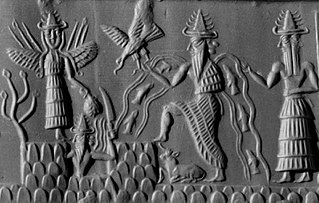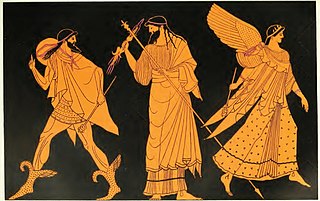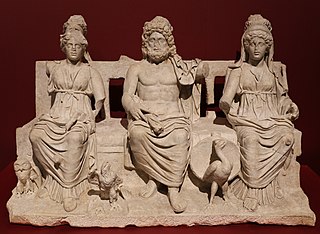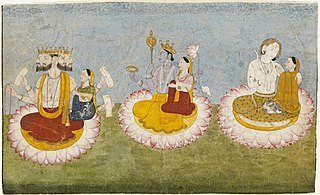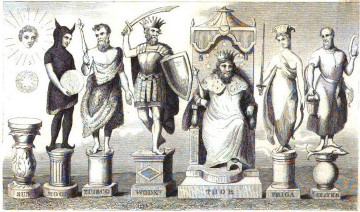Days of the week
"The astrological tradition has long held that when astronomy was originally united with astrology, the ancients named the visible planets according to each one's intrinsic archetypal character, that is, according to the mythic deity of which the planet was the visible manifestation. The earliest surviving Greek text that named all the known planets is the Platonist dialogue the Epinomis, which explicitly postulated a cosmic association between the planets and specific gods, speaking of them as cosmic powers and visible deities. Written in the fourth century BCE as an appendix to Plato's last work, the Laws ... the Epinomis affirmed the divinity of the planets and then went on to introduce the specific Greek name for each planet according to the deity which that planet was understood to be 'sacred to' - Hermes, Aphrodite, Ares, Zeus, Kronos. These Greek gods were cited as corresponding to the equivalent Mesopotaman deities whose names had long been associated with the planets by the already ancient astrological tradition inherited from Babylonia. In turn, in later centuries these planets became known in Europe and the modern West by the names of their Roman equivalents: Mercury, Venus, Mars, Jupiter and Saturn."
Exploring the history of the seven-day week is a very complicated matter. There are very different opinions about the history of the week. Modern seven-day week originates from the calendar of the Babylonians, which is based on a Sumerian calendar dated to 21st-century BCE. The original Sumerian calendar had a 360 day year with 12 months of 30 days and it was lunisolar. This means, that the length of the year tracked the Sun, while the months tracked the moon. Later, Babylonians figured out how to more precisely calculate the length of the year.
One theory for seven-day week is, seven days corresponds to the time it takes for a moon to transition between each phase: full, waning half, new and waxing half. Because the moon cycle is 29.53 days long, the Sumerians would insert one or two days into the final week of each month. Hence also the name MONTH - MOONth. Other theory is, the Sumerians named the week days after the celestial bodies: the Sun and the Moon, and the five visible planets: Mercury, Venus, Mars, Jupiter and Saturn. In both cases day names of the week are connected with astrology/astronomy.
Ancient Mesopotamian traditions
The Sumerians were the first to use calendars in Mesopotamia during the Bronze Age. The earliest possible evidence of an astrological significance of a seven-day period is connected to Gudea, the priest-king of Lagash in Sumer during the Gutian dynasty (about 2100 BCE), who built a seven-room temple, which he dedicated with a seven-day festival. In the flood story of the Assyro-Babylonian Epic of Gilgamesh, the storm lasts for seven days, the dove is sent out after seven days, and the Utnapishtim (biblical Noah) leaves the ark seven days after it reaches the firm ground. Number 7 was very important for Sumerians.
Also, counting from the new moon, the Babylonians celebrated the 7th, 14th, 21st and 28th as "holy days", also called "evil days" (meaning "unsuitable" for prohibited activities). On these days, officials were prohibited from various activities and common men were forbidden to "make a wish", and at least the 28th was known as a "rest day". On each of them, offerings were made to a different god or goddess.
| Day | Planet | Sumerian god | Babylonian god |
|---|---|---|---|
| Monday | Moon | Nanna | Sin |
| Tuesday | Mars | Gugalanna | Nergal |
| Wednesday | Mercury | Enki | Nabu |
| Thursday | Jupiter | Enlil | Marduk |
| Friday | Venus | Inanna | Ishtar |
| Saturday | Saturn | Ninurta | Ninurta |
| Sunday | Sun | Utu | Shamash |
Greek tradition
This was later also adopted by the Greeks. The Ptolemaic system of planetary spheres asserts that the order of the heavenly bodies, from the closest to the farthest to the Earth is: Moon, Mercury, Venus, Sun, Mars, Jupiter, Saturn. The planets are ordered from fastest to slowest moving as they appear in the night sky. The days were named after the planets of Hellenistic astrology, in the order: Sun, Moon, Mars (Ares), Mercury (Hermes), Jupiter (Zeus), Venus (Aphrodite) and Saturn (Cronos).
| Day | Planet | Ancient Greek | God |
|---|---|---|---|
| Monday | Moon | ἡμέρα Σελήνης (hēméra Selḗnēs) | Selene |
| Tuesday | Mars | ἡμέρα Ἄρεως (hēméra Áreōs) | Ares |
| Wednesday | Mercury | ἡμέρα Ἑρμοῦ (hēméra Hermoû) | Hermes |
| Thursday | Jupiter | ἡμέρα Διός (hēméra Diós) | Zeus |
| Friday | Venus | μέρα Ἀφροδίτης (hēméra Aphrodítēs) | Aphrodite |
| Saturday | Saturn | ἡμέρα Κρόνου (hēméra Krónou) | Kronos |
| Sunday | Sun | ἡμέρα Ἡλίου (hēméra Hēlíou) | Helios |
Roman tradition
The seven-day week spread throughout the Roman Empire in Late Antiquity. By the 4th century, it was in wide use throughout the Empire, and it had also reached India and China. To this day, all Romance languages (most familiarly Spanish, French and Italian) still bear the mark of Roman day names. They preserved the Latin names, except for the names of Sunday, which was replaced by Dominicus (Dominica), known as "the Lord's Day", and of Saturday, which was named after the Sabbath.
| Day | Planet | Latin | French | Italian | Spanish |
|---|---|---|---|---|---|
| Monday | Moon | dies Lunae (day of the Moon) | Lundi | Lunedì | Lunes |
| Tuesday | Mars | dies Martis (day of Mars) | Mardi | Martedì | Martes |
| Wednesday | Mercury | dies Mercurii (day of Mercury) | Mercredi | Mercoledì | Miércoles |
| Thursday | Jupiter | dies Iovis (day of Jupiter) | Jeudi | Giovedì | Jueves |
| Friday | Venus | dies Veneris (day of Venus) | Vendredi | Venerdì | Viernes |
| Saturday | Saturn | dies Saturni (day of Saturn) | Samedi | Sabato | Sábado |
| Sunday | Sun | dies Solis (day of the Sun) | Dimanche | Domenica | Domingo |
Hindu tradition
The ancient Hindus did not regularly use days of the week. The seven-day week appears in Indian history during the Gupta period (3rd - 5th centuries AD) brought there by Romans. Today they use them as vār meaning day. It is a translated version of the western system. Consequently the days of the week in several Indian languages are named after the same planets/gods as the Greco-Roman days of the week.
| Day | Planet | Hindi | God |
|---|---|---|---|
| Monday | Moon | सोमवार (Somvaar) | Soma, Chandra |
| Tuesday | Mars | मंगलवार (Mangalvaar) | Mangala |
| Wednesday | Mercury | बुधवार (Budhvaar) | Budha |
| Thursday | Jupiter | गुरुवार (Guruvaar) | Brihaspati, Guru |
| Friday | Venus | शुक्रवार (Shukravaar) | Shukra |
| Saturday | Saturn | शनिवार (Shanivaar) | Shani |
| Sunday | Sun | रविवार (Ravivaar) | Aditya, Ravi, Surya |
Germanic tradition
Various Germanic languages having adopted the Greco-Roman system of naming of the days of the week after the classical planets, inserting loan translations for the names of the planets, substituting the names of Germanic gods in a process known as "interpretatio germanica". The date of the introduction of this system is not known exactly, but it must have happened later than AD 200 but before the introduction of Christianity during the 6th to 7th centuries.
The English words for each day bear remnants of Roman tradition, but they have been filtered through centuries of Germanic and Norse mythos.
| Day | Planet | Old English | Old Norse | German | God |
|---|---|---|---|---|---|
| Monday | Moon | Mōnandæg (Moon's day) | Mánadagr | Montag | Máni |
| Tuesday | Mars | Tīwesdæg (Tiw's day) | Tysdagr | Dienstag | Týr |
| Wednesday | Mercury | Wōdnesdæg (Woden's day) | Óðinsdagr | Mittwoch, Wutenstag | Woden/Odin |
| Thursday | Jupiter | Þūnresdæg (Thunor's day) | þórsdagr | Donnerstag | Thor |
| Friday | Venus | Frīgedæg (Frigg's day) | Frjádagr | Freitag | Frigg/Fríge/Frēa |
| Saturday | Saturn | Sæturnesdæg/Sonnabend (Saturn's day/Sunday Eve) | Laugardagr/Sunnunótt | Samstag | |
| Sunday | Sun | Sunnandæg (Sun's day) | Sunnudagr | Sonntag | Sunna/Sól |
